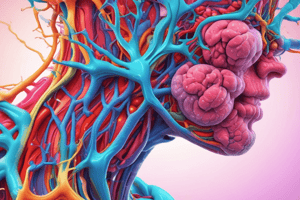Podcast
Questions and Answers
What is the main function of hormones within the endocrine system?
What is the main function of hormones within the endocrine system?
- To initiate direct cellular division
- To control muscle contraction directly
- To increase blood flow without any target specificity
- To bind to receptors and trigger responses in target cells (correct)
Which gland produces triiodothyronine and thyroxine?
Which gland produces triiodothyronine and thyroxine?
- Pancreas
- Adrenal gland
- Pituitary gland
- Thyroid gland (correct)
What is a misconception regarding hormone production in men and women?
What is a misconception regarding hormone production in men and women?
- Both genders produce estrogen and testosterone in different amounts (correct)
- Estrogen is only produced in women
- Women do not produce any testosterone
- Only men produce testosterone
Which of the following factors does NOT disrupt hormonal regulation?
Which of the following factors does NOT disrupt hormonal regulation?
What is the primary role of the endocrine system?
What is the primary role of the endocrine system?
During puberty in women, the secretion of which hormone is responsible for physical changes such as hip widening?
During puberty in women, the secretion of which hormone is responsible for physical changes such as hip widening?
Which is NOT a function affected by thyroid hormones?
Which is NOT a function affected by thyroid hormones?
How do hormones influence mood and behavior?
How do hormones influence mood and behavior?
The ______ system is vital for orchestrating bodily changes throughout life, including growth, puberty, and reproduction.
The ______ system is vital for orchestrating bodily changes throughout life, including growth, puberty, and reproduction.
Hormones are released in tiny amounts into the ______ to target specific cells.
Hormones are released in tiny amounts into the ______ to target specific cells.
The thyroid gland produces two main hormones, triiodothyronine and ______, which regulate energy usage.
The thyroid gland produces two main hormones, triiodothyronine and ______, which regulate energy usage.
In men, ______ secretion from the testes leads to sexual organ development and facial hair growth.
In men, ______ secretion from the testes leads to sexual organ development and facial hair growth.
Estrogen from the ovaries marks the onset of adulthood in ______.
Estrogen from the ovaries marks the onset of adulthood in ______.
Hormones can affect brain chemistry, particularly the production of ______, leading to mood fluctuations.
Hormones can affect brain chemistry, particularly the production of ______, leading to mood fluctuations.
The primary role of the endocrine system is to regulate ______ processes.
The primary role of the endocrine system is to regulate ______ processes.
Factors like disease, stress, and diet can disrupt hormonal ______.
Factors like disease, stress, and diet can disrupt hormonal ______.
Flashcards are hidden until you start studying
Study Notes
Overview of the Endocrine System
- The endocrine system is vital for orchestrating bodily changes throughout life, including growth, puberty, and reproduction.
- It regulates a variety of functions such as sleep patterns, heart rhythm, and cellular processes.
Key Components
- The system operates through three essential features: glands, hormones, and cell receptors.
- Hormone-producing glands include three in the brain and seven in the rest of the body, surrounded by blood vessels for hormone manufacture.
Hormones and Their Functions
- Hormones are released in tiny amounts into the bloodstream to target specific cells.
- Each hormone binds to specific receptors on or in the target cells, triggering varied responses that modulate cellular behavior.
Thyroid Hormones
- The thyroid gland produces triiodothyronine and thyroxine, affecting energy usage and regulating functions like breathing, heartbeat, body temperature, and digestion.
Hormonal Changes During Puberty
- In men, testosterone secretion from the testes leads to sexual organ development, facial hair growth, voice deepening, and increased height.
- In women, estrogen from the ovaries marks the onset of adulthood, resulting in hip widening and preparation of the womb for menstruation or pregnancy.
Misconceptions about Hormones
- Both men and women produce estrogen and testosterone, though in different proportions, influencing mood and many physiological processes.
Influence on Mood and Behavior
- Hormones can affect brain chemistry, particularly the production of serotonin, leading to mood fluctuations.
- Behavior is shaped by a combination of hormones, neurotransmitters, and social factors, not solely by hormonal influence.
Endocrine System Regulation
- The primary role of the endocrine system is to regulate bodily processes, not to control behavior.
- Factors like disease, stress, and diet can disrupt hormonal regulation; for example, diabetes results from insufficient insulin production.
Common Hormonal Disorders
- Diabetes occurs when the pancreas secretes inadequate insulin, affecting blood sugar management.
- Thyroid disorders, such as hypo- and hyperthyroidism, arise from imbalances in thyroid hormone production, leading to symptoms like fatigue or irritability.
Balance and Adaptation
- Despite potential disruptions, the endocrine system usually maintains a state of balance, allowing individuals to grow and adapt throughout their lives.
Overview of the Endocrine System
- Essential for managing bodily transformations like growth, puberty, and reproduction.
- Regulates various functions including sleep cycles, heart rhythms, and cellular activities.
Key Components
- Comprised of three main features: glands, hormones, and cell receptors.
- Contains three hormone-producing glands in the brain and seven in other body areas, encompassed by blood vessels for hormone production.
Hormones and Their Functions
- Hormones are secreted in minuscule amounts into the bloodstream, targeting specific cells.
- Each hormone binds to unique receptors on the target cells, initiating diverse responses that alter cellular functions.
Thyroid Hormones
- The thyroid gland synthesizes triiodothyronine (T3) and thyroxine (T4), crucial for energy expenditure.
- Regulates significant functions including respiration, heart rate, body temperature, and digestion.
Hormonal Changes During Puberty
- Testosterone from the testes in males promotes development of sexual organs, growth of facial hair, voice changes, and increased stature.
- Estrogen from the ovaries in females triggers adult characteristics like hip widening and prepares the uterus for menstruation or pregnancy.
Misconceptions about Hormones
- Both genders produce estrogen and testosterone, albeit in differing quantities, impacting mood and various physiological functions.
Influence on Mood and Behavior
- Hormones can alter brain chemistry, particularly the modulation of serotonin, leading to mood changes.
- Behavior results from a combination of hormones, neurotransmitters, and social influences, not just hormonal levels.
Endocrine System Regulation
- Main function is to oversee bodily processes rather than directly control behavior.
- Hormonal regulation can be disrupted by factors like illness, stress, and dietary choices, with diabetes being a result of insufficient insulin secretion.
Common Hormonal Disorders
- Diabetes arises from inadequate insulin from the pancreas, impacting blood sugar control.
- Thyroid disorders, including hypo- and hyperthyroidism, occur due to imbalances in thyroid hormones, causing symptoms such as fatigue or mood swings.
Balance and Adaptation
- The endocrine system generally upholds homeostasis, enabling individuals to develop and adapt throughout their lives despite potential disruptions.
Overview of the Endocrine System
- Essential for managing bodily transformations like growth, puberty, and reproduction.
- Regulates various functions including sleep cycles, heart rhythms, and cellular activities.
Key Components
- Comprised of three main features: glands, hormones, and cell receptors.
- Contains three hormone-producing glands in the brain and seven in other body areas, encompassed by blood vessels for hormone production.
Hormones and Their Functions
- Hormones are secreted in minuscule amounts into the bloodstream, targeting specific cells.
- Each hormone binds to unique receptors on the target cells, initiating diverse responses that alter cellular functions.
Thyroid Hormones
- The thyroid gland synthesizes triiodothyronine (T3) and thyroxine (T4), crucial for energy expenditure.
- Regulates significant functions including respiration, heart rate, body temperature, and digestion.
Hormonal Changes During Puberty
- Testosterone from the testes in males promotes development of sexual organs, growth of facial hair, voice changes, and increased stature.
- Estrogen from the ovaries in females triggers adult characteristics like hip widening and prepares the uterus for menstruation or pregnancy.
Misconceptions about Hormones
- Both genders produce estrogen and testosterone, albeit in differing quantities, impacting mood and various physiological functions.
Influence on Mood and Behavior
- Hormones can alter brain chemistry, particularly the modulation of serotonin, leading to mood changes.
- Behavior results from a combination of hormones, neurotransmitters, and social influences, not just hormonal levels.
Endocrine System Regulation
- Main function is to oversee bodily processes rather than directly control behavior.
- Hormonal regulation can be disrupted by factors like illness, stress, and dietary choices, with diabetes being a result of insufficient insulin secretion.
Common Hormonal Disorders
- Diabetes arises from inadequate insulin from the pancreas, impacting blood sugar control.
- Thyroid disorders, including hypo- and hyperthyroidism, occur due to imbalances in thyroid hormones, causing symptoms such as fatigue or mood swings.
Balance and Adaptation
- The endocrine system generally upholds homeostasis, enabling individuals to develop and adapt throughout their lives despite potential disruptions.
Studying That Suits You
Use AI to generate personalized quizzes and flashcards to suit your learning preferences.





